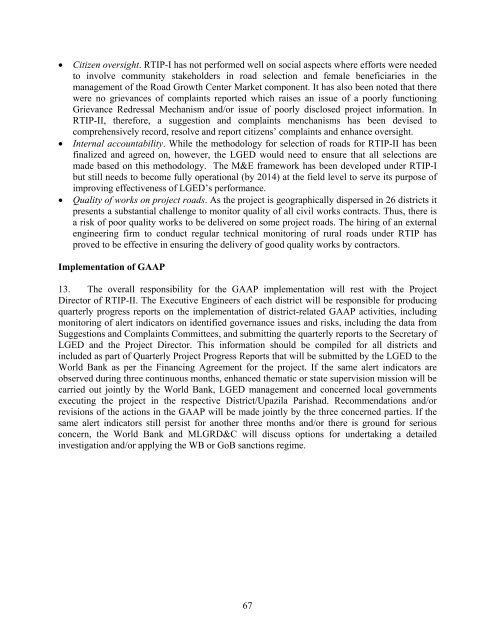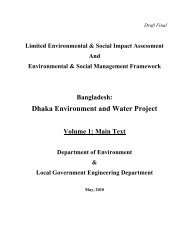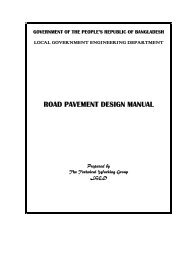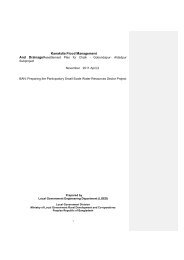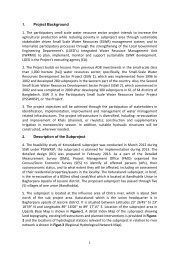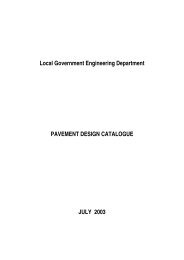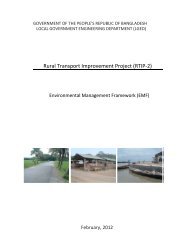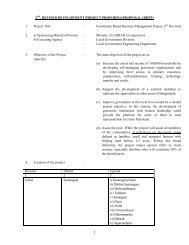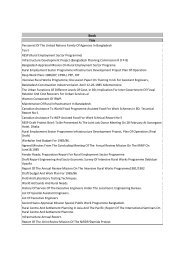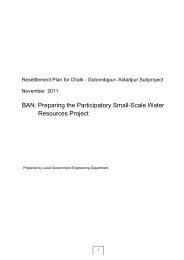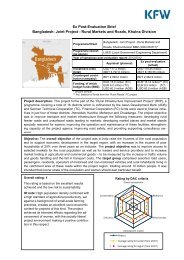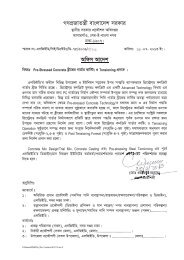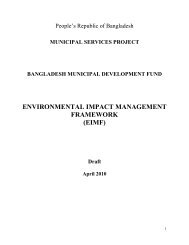PAD - LGED
PAD - LGED
PAD - LGED
Create successful ePaper yourself
Turn your PDF publications into a flip-book with our unique Google optimized e-Paper software.
• Citizen oversight. RTIP-I has not performed well on social aspects where efforts were needed<br />
to involve community stakeholders in road selection and female beneficiaries in the<br />
management of the Road Growth Center Market component. It has also been noted that there<br />
were no grievances of complaints reported which raises an issue of a poorly functioning<br />
Grievance Redressal Mechanism and/or issue of poorly disclosed project information. In<br />
RTIP-II, therefore, a suggestion and complaints menchanisms has been devised to<br />
comprehensively record, resolve and report citizens’ complaints and enhance oversight.<br />
• Internal accountability. While the methodology for selection of roads for RTIP-II has been<br />
finalized and agreed on, however, the <strong>LGED</strong> would need to ensure that all selections are<br />
made based on this methodology. The M&E framework has been developed under RTIP-I<br />
but still needs to become fully operational (by 2014) at the field level to serve its purpose of<br />
improving effectiveness of <strong>LGED</strong>’s performance.<br />
• Quality of works on project roads. As the project is geographically dispersed in 26 districts it<br />
presents a substantial challenge to monitor quality of all civil works contracts. Thus, there is<br />
a risk of poor quality works to be delivered on some project roads. The hiring of an external<br />
engineering firm to conduct regular technical monitoring of rural roads under RTIP has<br />
proved to be effective in ensuring the delivery of good quality works by contractors.<br />
Implementation of GAAP<br />
13. The overall responsibility for the GAAP implementation will rest with the Project<br />
Director of RTIP-II. The Executive Engineers of each district will be responsible for producing<br />
quarterly progress reports on the implementation of district-related GAAP activities, including<br />
monitoring of alert indicators on identified governance issues and risks, including the data from<br />
Suggestions and Complaints Committees, and submitting the quarterly reports to the Secretary of<br />
<strong>LGED</strong> and the Project Director. This information should be compiled for all districts and<br />
included as part of Quarterly Project Progress Reports that will be submitted by the <strong>LGED</strong> to the<br />
World Bank as per the Financing Agreement for the project. If the same alert indicators are<br />
observed during three continuous months, enhanced thematic or state supervision mission will be<br />
carried out jointly by the World Bank, <strong>LGED</strong> management and concerned local governments<br />
executing the project in the respective District/Upazila Parishad. Recommendations and/or<br />
revisions of the actions in the GAAP will be made jointly by the three concerned parties. If the<br />
same alert indicators still persist for another three months and/or there is ground for serious<br />
concern, the World Bank and MLGRD&C will discuss options for undertaking a detailed<br />
investigation and/or applying the WB or GoB sanctions regime.<br />
67


